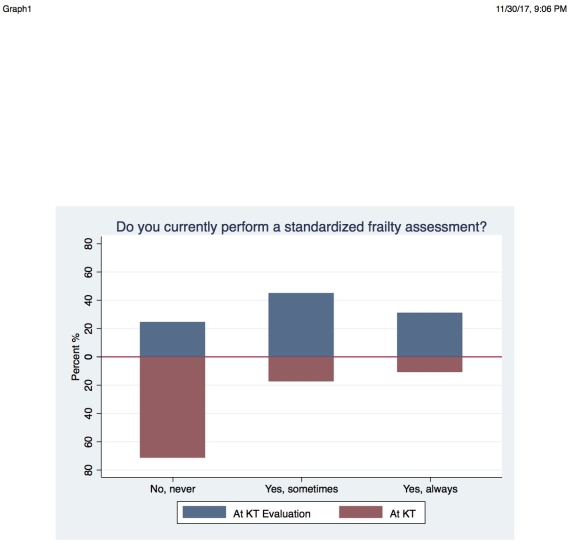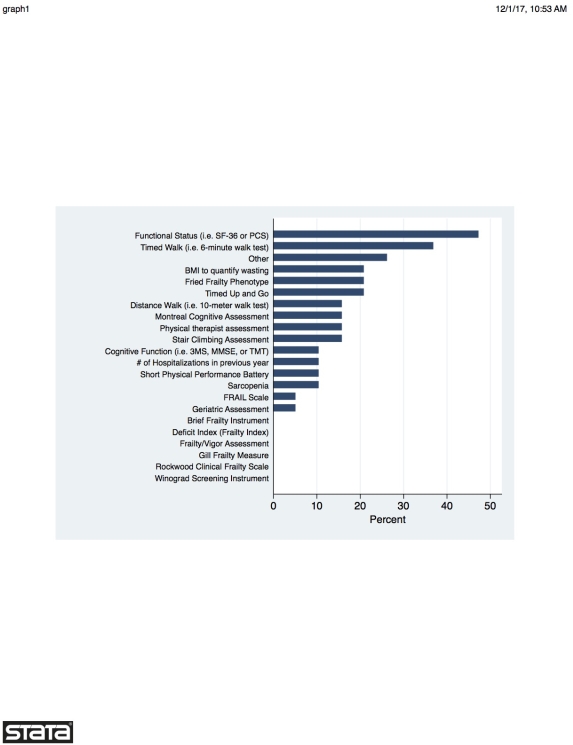Frailty and Kidney Transplantation: AST-KPCOP Survey of Center Practices
Kidney Pancreas COP, AST, Mt. Laurel.
Meeting: 2018 American Transplant Congress
Abstract number: B319
Keywords: Age factors, Kidney transplantation, Screening
Session Information
Session Name: Poster Session B: Non-Organ Specific: Economics, Public Policy, Allocation, Ethics
Session Type: Poster Session
Date: Sunday, June 3, 2018
Session Time: 6:00pm-7:00pm
 Presentation Time: 6:00pm-7:00pm
Presentation Time: 6:00pm-7:00pm
Location: Hall 4EF
Background: Frailty is a clinical phenotype of decreased physiologic reserve and resistance to stressors. Given the potential utility of frailty evaluation as prognosticator of kidney transplant (KT) outcomes, we sought to understand how frailty is being measured and used in clinical practice, through a survey of US KT centers.
Methods: Survey about practices related to frailty were distributed electronically to members of the AST Kidney/Pancreas Community of Practice (Nov. 2017) and of the 204 adult centers, 33 responded to date (16%) with an expected response >70% by early 2018.
Results: Frailty is commonly measured as part of KT candidacy evaluation (Fig. 1). Frailty assessments were most often performed by a nurse (29%) or doctor (24%). The most commonly used metric was functional status (Fig.2); 63% reported performing >1 assessment. The protocol for frailty assessments varied. 19% performed these assessments only for older patients. The most common use of frailty assessments was to determine transplant candidacy (81%). When a patient was identified as being frail, respondents were less likely to list the patient (95%), and were more likely to tailor maintenance immunosuppression (52%), and to prescribe prehabilitation (52%).
Conclusions: In a subsample of US KT centers, we found that frailty is commonly assessed as part of KT evaluation and is used to make decision about transplant candidacy, yet there is variability in how and in whom frailty is measured across centers. Efforts to standardize the measurement and clinical practice may improve equitable access to KT and outcomes of KT recipients.
CITATION INFORMATION: McAdams DeMarco M., Rasmussen S., Parsons R., Alhamad T., Johansen K., Tullius S., Lynch R., Harhay M., Rao M., Berger J., Lappin J., Tan J., Cheng X., Woodside K., Parajuli S., Lentine K., Kaplan B., Segev D., Kobashigawa J., Dadhania D. Frailty and Kidney Transplantation: AST-KPCOP Survey of Center Practices Am J Transplant. 2017;17 (suppl 3).
To cite this abstract in AMA style:
DeMarco MMcAdams, Rasmussen S, Parsons R, Alhamad T, Johansen K, Tullius S, Lynch R, Harhay M, Rao M, Berger J, Lappin J, Tan J, Cheng X, Woodside K, Parajuli S, Lentine K, Kaplan B, Segev D, Kobashigawa J, Dadhania D. Frailty and Kidney Transplantation: AST-KPCOP Survey of Center Practices [abstract]. https://atcmeetingabstracts.com/abstract/frailty-and-kidney-transplantation-ast-kpcop-survey-of-center-practices/. Accessed February 23, 2026.« Back to 2018 American Transplant Congress


